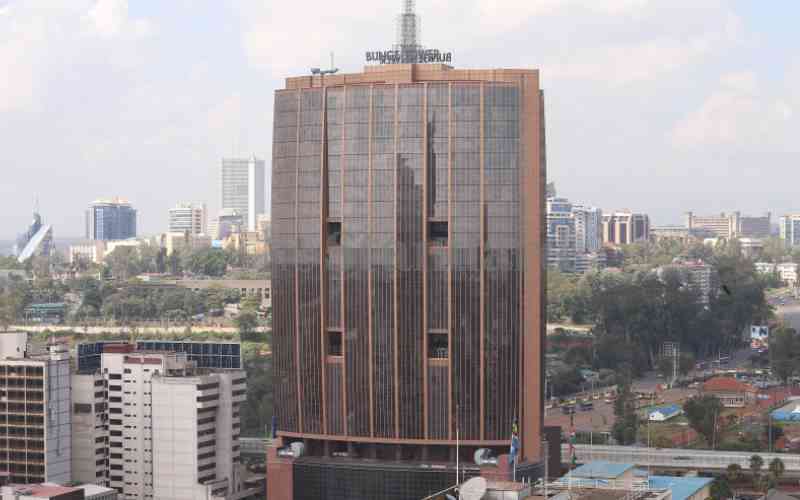By Alex Ndegwa and Peter Opiyo
Embarrassed, startled by national outrage, and shocked by media exposure of their selfish interests, Members of Parliament reversed some of the stunning amendments they passed on Wednesday night.
The MPS had ganged up against the new electoral laws on political parties and academic levels for running a process seen to be a subversion of the sovereign will of Kenyans as expressed in the 2010 referendum on Constitution.
Though they reinstated academic ceiling of university degrees for parliamentary and presidential candidates, forced by the realisation they risked lower salary grading by Salary Remuneration Commission, the MPs, however, retained the ticket they gave themselves to change parties as they wish.
This means the country could have lost the hope of enforcing discipline in political parties, which is a key pillar of democracy.
The confusing, but half-hearted change of tune by MPs cast a negative image of leaders torn between being faithful to the national interest, and working for their personal gains.
The MPs rescinded a provision that had exempted MPs and councillors from high academic credentials spelt out in law should they defend their positions in the March 2013 General Election.
The U-turn came hours after the acrimonious Wednesday night session during which MPs passed controversial amendments to the Political Parties Act and Elections Act, which have sparked public condemnation.
Amendments designed to facilitate party hopping as dozens of MPs face court cases for defections yet they have clung onto their parliamentary seats, were effected to the Statute Law (Miscellaneous Amendments) Bill.
Through the Omnibus legislation, which enables a review of multiple laws at ago, lawmakers relaxed stringent electoral timelines whose effect was to permit last-minute defections for losers of party nominations.
But the MPs still made sure losers of presidential elections and their running mates would find their way back into the House after political parties were allowed to nominate them.
But the MPs rejected a proposal to allow presidential candidates to run for other elective seats apparently determined to ward off competition.
The new academic qualifications will lock out about 80 MPs, who will not be eligible to vie because they are not university graduates.
It will also apply in the event of any pending by-elections because the law comes into effect immediately.
On Thursday, the Commission for the Implementation of the Constitution, the Law Society of Kenya, and civil society organisations condemned the changes as an assault on the Constitution, which was ratified in August 2010.
Stay informed. Subscribe to our newsletter
Challenge
They vowed to challenge the unconstitutional amendments in court.
“We see these amendments as an illegality and a move by Parliament to circumvent the provisions of the Constitution, which deal with leadership and integrity,” LSK Chairman, Eric Mutua, said in a statement.
The Kenyans for Peace with Truth and Justice said during a press conference at the Kenya Human Rights Commission offices in Nairobi: “Kenyans must rise up against these schemes by Members of Parliament to erode reform as established by the Constitution.”
“Should the Bill be enacted into law we shall, together with other like-minded organisations and individuals, take legal action in courts of law, so as to uphold, defend and protect the letter and spirit of the Constitution,” concluded the statement signed by Atsango Chesoni, Executive Director, and KHRC.
The MPs reinstated the requirement for a university degree certificate for those seeking to contest parliamentary seats. They also reinstated post-secondary school qualification for County Assembly representatives.
But even that move followed the caution that MPs stood to earn less because the Salaries and Remuneration Commission would peg earnings on academic qualifications.
Transport Minister Amos Kimunya reopened discussions on the contentious clause warning lower qualifications for entry to Parliament would reduce their pay.
Finance Minister Njeru Githae said the Commission was trying to allocate salaries based on academic qualifications, workload, and responsibilities. “It is important we have some higher qualifications so that when the salaries are being reviewed MPs do not lose out because they don’t have degrees,” Githae warned.
That eventually saw the scrapping of the blanket provision by Bura MP Abdi Nuh, which provided that academic credentials did not matter for MPs and councillors who defended their seats.
In the changes debated by the House and passed under the simple majority and acclamation rule, MPs voted for amendments to shield their colleagues who had deserted parties that sponsored them to Parliament from losing their seats.
On Wednesday night tempers flared during proceedings, which went until midnight, as members engaged in angry exchanges.
The Chair of the Committee of the Whole House during scrutiny of the Bill Joyce Laboso ordered ODM nominated MP Rachael Shebesh out of the Chamber for disorderly conduct.
Heckled
ODM Parliamentary Group Secretary, Ababu Namwamba, was heckled as he read out a letter by CIC chairman warning of court action if the unconstitutional provisions were passed. “We cannot allow people to continue defiling the Constitution. No amount of heckling will turn this into a House of legislative banditry and piracy,” Namwamba said.
When he asked Attorney General Githu Muigai’s advice on the issue, the AG replied the Speaker had certified the Bill, and it was upon the MP to persuade colleagues.
The chairman of Parliament’s Constitutional Implementation Oversight Committee chairman Abdikadir Mohammed told off Namwamba, saying Parliament’s legislative role could not be muzzled.
“CIC is an important institution under the Constitution, but the functions of CIC does not include supervision of Parliament,” Abdikadir said.
Gachoka MP Mutava Musyimi defended his amendment to shield party-hopping MPs from losing their seats, saying the country was undergoing a delicate transition.
“This nation is in transition and transitions are not easy. We need to give parties the necessary legal framework during this transition period to facilitate negotiations that are about the future of the country,” said Musyimi.
“The law was made for man not man for law. If it is necessary to change the law we should do so without feeling intimidated,” he added.
Gichugu MP Martha Karua said the changes had opened a floodgate for party-hopping and political promiscuity. “It is a great shame that shortly after passing the new Constitution and the Political Parties Act, we MPs are saying, allow us as the rest of Kenya obeys the Constitution, to misbehave just a little, not to be faithful to the parties through which we have come to Parliament,” Karua said.
Gem MP Jakoyo Midiwo said: “The people who are used to (political party) indiscipline will win. But my colleagues should know that there cannot be a thriving multiparty democracy if there is no party discipline.”
Embakasi MP Ferdinard Waititu argued the only way to ensure candidates were not shortchanged through bribery during party nominations was to allow last-minute defections.
 The Standard Group Plc is a
multi-media organization with investments in media platforms spanning newspaper
print operations, television, radio broadcasting, digital and online services. The
Standard Group is recognized as a leading multi-media house in Kenya with a key
influence in matters of national and international interest.
The Standard Group Plc is a
multi-media organization with investments in media platforms spanning newspaper
print operations, television, radio broadcasting, digital and online services. The
Standard Group is recognized as a leading multi-media house in Kenya with a key
influence in matters of national and international interest.
 The Standard Group Plc is a
multi-media organization with investments in media platforms spanning newspaper
print operations, television, radio broadcasting, digital and online services. The
Standard Group is recognized as a leading multi-media house in Kenya with a key
influence in matters of national and international interest.
The Standard Group Plc is a
multi-media organization with investments in media platforms spanning newspaper
print operations, television, radio broadcasting, digital and online services. The
Standard Group is recognized as a leading multi-media house in Kenya with a key
influence in matters of national and international interest.









